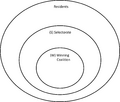Selectorate theory facts for kids
Selectorate Theory is a way of understanding why political leaders make the choices they do. It suggests that leaders act in smart, planned ways to get and keep power. Bruce Bueno de Mesquita first came up with this idea.
Contents
How This Idea Started
This theory was first introduced in 1993. Bruce Bueno de Mesquita and his friends, Alastair Smith, Randolph M. Siverson, and James D. Morrow, wrote about it. Their book was called The Logic of Political Survival.
Later, in 2011, they made the theory even better in a book called The Dictator's Handbook. This book explains how the Selectorate Theory works. It also shows how its ideas can help make politics better around the world.
Key Ideas of Selectorate Theory
Leaders Need Support
One main idea of Selectorate Theory is that no leader ever rules completely alone. Even the most powerful leaders need help from some people. These people either do things for the leader or tell others what to do.
This means a leader must convince a certain group of people to support them. This support is needed to gain or stay in power. This group of important people is called the selectorate. The selectorate is split into three different types of people.
Three Groups of People in Politics
To keep or get power, a leader or someone trying to become a leader needs to know about three groups of people:
- The Essentials are the people whose support is absolutely needed. A leader cannot get or keep power without them.
- The Influentials are important for a leader to gain power. However, they might not be the main people who decide if the leader stays in power.
- The Nominals are people who have some say in who is in charge. But a leader does not strictly need their support to get power.
Leaders and the selectorate work together in many ways. This often happens through five main rules that leaders follow. These rules help them get and keep power.
Five Rules for Leaders to Follow
Leaders often follow these five rules to stay in charge:
- A leader wants to rely on as few Essentials as possible. This makes it easier to control them.
- A leader wants to have a very large group of Nominals. This way, they can easily replace any Essentials or Influentials who are not loyal.
- A leader must have a way to pay their selectorate. This money usually comes from taxes and the government's funds.
- A leader must pay their Essentials enough to keep them loyal. But they should not pay them more than needed.
- A leader should not take money away from their Essentials. This money should not be used to make life better for everyone else.
Two Ways Governments Work
Selectorate Theory describes two main ways governments can work. One way is with a small group of Essentials, called a small coalition. The other way is with a large group of Essentials, called a large coalition.
Governments with a small coalition are often like autocracies. Examples include countries like the old Soviet Union. In these systems, a leader stays in power because only a few people are rewarded for their loyalty. The leader can give these Essentials special rewards, like money or property.
Governments with a large coalition make leaders appeal to many people. This often happens through elections. In these systems, it is not possible to bribe every single voter or Essential. Instead, leaders use tax money to create policies. These policies usually benefit their Essentials more than other groups.
How the Selectorate Affects Leaders
Understanding how leaders and their selectorate work together helps explain many things. It shows how decisions are made both inside a country and with other countries.
Why Monarchies Changed
A Monarchy is a system where a king or queen rules. They have a small group of lords or nobles who support them. However, only a few people can become part of this powerful group.
This means someone trying to take power can easily promise big rewards to those who are not yet in the court. At the same time, those already in the court always worry about being replaced. This can make them less loyal.
Because of this, democracy and autocracy are more stable for leaders. These systems allow leaders to follow the Second Rule: keep the Nominal selectorate as large as possible.
Foreign Aid and Leaders
Foreign aid is money or help given from a rich country to a poorer one. When this aid comes with no rules, it often creates a special link between dictators and democratic leaders.
Governments with large coalitions (like many democracies) send foreign aid. They do this as a way to keep their own power. Meanwhile, the poorer nations, often run by small coalitions (like dictatorships), take this money. They then share it among their small group of loyal supporters. The money often does not truly help the people in need.
Images for kids
See also
 In Spanish: Teoría del selectorado para niños
In Spanish: Teoría del selectorado para niños
 | Delilah Pierce |
 | Gordon Parks |
 | Augusta Savage |
 | Charles Ethan Porter |


